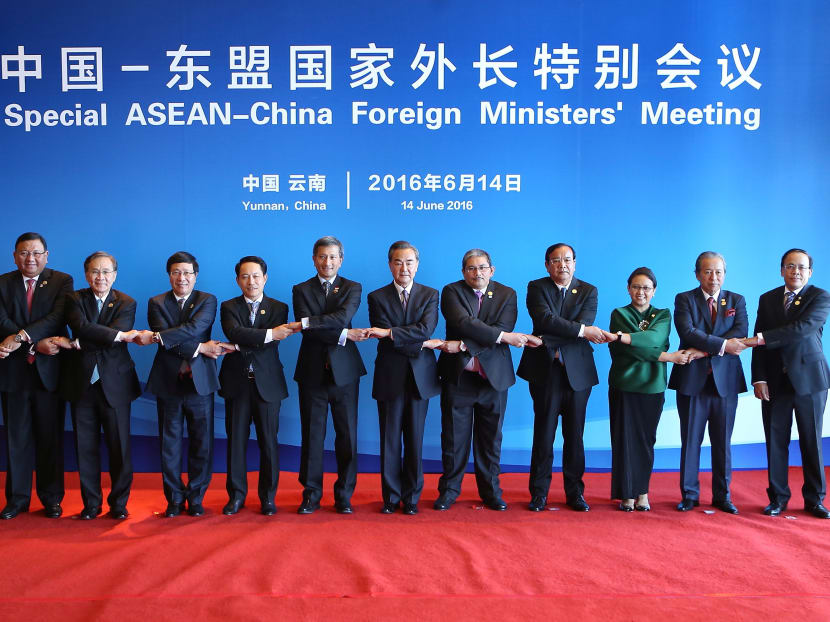In new setback, Asean retracts S China Sea statement
SINGAPORE — The Association of South-east Asian Nations (Asean) issued and then swiftly retracted a tough statement on tensions in the South China Sea, in another embarrassing setback for the group whose members remain split on the increasingly heated territorial disputes in the region.

Officials pose for pictures during the Special ASEAN-China Foreign Ministers' Meeting in Yuxi, Yunnan Province, China, June 14, 2016. Photo via Reuters
SINGAPORE — The Association of South-east Asian Nations (Asean) issued and then swiftly retracted a tough statement on tensions in the South China Sea, in another embarrassing setback for the group whose members remain split on the increasingly heated territorial disputes in the region.
The statement from the 10-nation regional bloc was issued on Tuesday evening (June 14) by a Malaysian Foreign Ministry spokesman via a WhatsApp chat group with regional media, following a meeting in the Chinese city of Kunming between foreign ministers from Asean and China.
“On the South China Sea, we had a candid exchange with Chinese Foreign Minister Wang Yi in view of the recent developments on the ground,” said the press statement by the Asean foreign ministers.
“We expressed our serious concerns over recent and ongoing developments, which have eroded trust and confidence, increased tensions and which may have the potential to undermine peace, security and stability in the South China Sea.”
But hours later, the Malaysian spokesman recalled the statement, saying “urgent amendments” needed to be made and an updated version would be sent. However, no updated Asean statement was later issued.
The Asean-China meeting was held ahead of a ruling by the Permanent Court of Arbitration in The Hague on a case brought by the Philippines contesting Beijing’s claims in the South China Sea.
China has refused to recognise the case and says all disputes should be resolved through bilateral talks.
The case has become the centre of an international diplomatic arm wrestle, with the United States and its allies insisting on international law being obeyed and China saying it has widespread support for its position, including from some ASEAN members. In April, Mr Wang announced that China, Brunei, Cambodia and Laos had reached a “consensus” on South China Sea, in a move that split Asean, observers said.
TODAY understands that during this week’s two-day meeting in Kunming, China had pushed hard for a joint statement with all 10 Asean members to express consensus on the South China Sea. But there was no agreement within Asean, which then agreed on a text for its press statement on the outcome of the meeting.
But China lobbied strongly against the move, resulting in two Asean countries — believed to be Cambodia and Laos — withdrawing support for the statement at the last minute. This effectively means none can be issued, as the pact operates on a policy of consensus under which all members must agree on statements.
It is unclear whether Malaysia’s decision to release the statement came before or after the objection. Its foreign ministry did not respond to calls and messages from TODAY.
“The scale and impact of this retraction is unprecedented,” said Dr Tang Siew Mun, the head of the Asean Studies Centre at ISEAS-Yusof Ishak Institute. “The fact that the retraction came from a Malaysian foreign affairs official is intriguing and deserves an explanation from the Malaysian leadership.”
On Wednesday, Indonesian Foreign Ministry spokesman Armanatha Nasir said the statement was issued in error, as a meeting overran and ended in confusion. He said the statement was a “media guideline” that had been prepared for a planned press conference for the conclusion of the meeting.
“However, because of the meeting dynamics where the meeting extended a few hours past schedule, the press conference was cancelled and a number of Asean ministers had to leave immediately,” he said.
Either way, the disarray was another example of the bloc’s long-running inability to present a united front toward China, which observers say has allowed Beijing to expand its sway over much of the South China Sea despite overlapping claims.
Mr Wang had been at pains on Tuesday to emphasise consensus on the issue, although he ended up appearing alone at a delayed news conference instead of alongside his Singaporean counterpart Vivan Balakrishnan, as expected. Singapore is currently the country coordinator for Asean-China relations.
Asked whether China had objected to the Asean statement, Foreign Ministry spokesman Lu Kang did not answer directly on Wednesday, but said Beijing had been assured that it was not an official Asean document and had been retracted. “This meeting was a closed-door meeting and from the beginning there was no preparation to make a joint statement,” said Mr Lu.
“If Asean wants to officially issue something that represents its stance, it should be agreed upon by all Asean members,’’ he added, implying a lack of consensus within the grouping.
Dr Tang cautioned that, despite this, Beijing should not ignore its members’ sense of unease. “Rather than celebrating yet another victory at foiling a united Asean stand, China should contemplate the strategic implications and negative impact the South China Sea issues have on its relations with Asean,” he said.
“The bottomline is China could no longer paper over these issues with promissory trade benefits and improved economic relations.” AGENCIES






